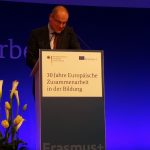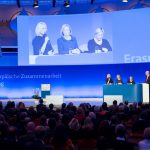30 years of European cooperation in education were honored at a festive event in the Berlin Congress Center on 24 January 2017. Among the prominent guests were Tibor Navracsics, EU Commissioner for Education, Culture, Youth and Sport, Prof. Dr. Johanna Wanka, Federal Minister for Education and Research, Manuela Schwesig, Federal Minister for Family, Senior Citizens, Women and Youth, Dr. Susanne Eisenmann, Minister of Culture, Youth and Sport of the State of Baden-Württemberg and President of the Conference of Ministers of Education and Cultural Affairs.
At the center of the event, in which the four German National Agencies responsible for the implementation Erasmus + were involved, the focus was on the European educational programs and the future of Erasmus +. Participants and institutions reported on the changes in the programs, but also on personal and professional experiences that have shaped them.
At the end of the meeting, a panel discussion “What does Europe need in the future” took place. Carmen Stadelhofer, chairman of ILEU e.V. and DANET e.V., emphasized the importance of the adult education program, which received little attention in the event. She also raised the question of what “Europe” was the talk about, and showed the Danube-Networkers as an example of the importance of the active involvement of civil society from South-Eastern European countries as a peaceful and solidarity-based Europe.
The Erasmus program of the European Union was launched in 1987 to promote the exchange of students in Europe. Today, the current Erasmus +, the EU program for education, training, youth and sport, (2014 – 2020) promotes mobility learners, among others, also in vocational and adult education, and supports people of all ages to acquire employment-relevant and intercultural skills. It has a budget of around 14.8 billion euros. By 2020 more than four million scholarship holders are expected.
More: https://www.na-bibb.de/presse/news/30-jahre-erasmus/



